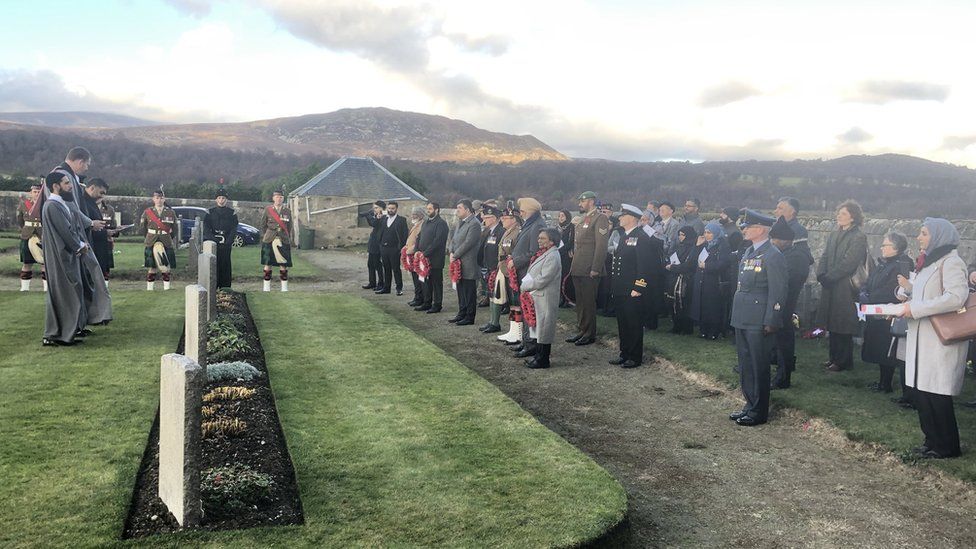WW2 Indian soldiers who died in Scotland remembered
- Published

Indian soldiers who died in Scotland during World War Two have been honoured at a multi-faith remembrance service.
The event, the first of its kind, was held at Kingussie in the Cairngorms, where most of the 13 men were laid to rest.
The Muslim soldiers were a part of Force K6, a mule transport corps that served alongside the British Army.
Nine of the 13 men died while they were in the Cairngorms for mountain training.
They had been sent to the area after being evacuated from France at Dunkirk to prepare for a possible invasion of Norway.
The soldiers of the Royal Indian Army Service Corps were remembered at a wreath-laying ceremony in Kingussie Cemetery, the single largest graveyard in the UK where Force K6 soldiers were buried.
Other soldiers of the corps were buried in cemeteries in Aberdeen, Dornoch and Grange in Aberdeenshire.
At Kingussie, an Islamic prayer and an Armed Forces blessing took place at their gravesides.
Scotland's Royal Indian Army Service Corps
The 13 soldiers buried in Scotland mainly died from accidents on exercise, or illnesses such as tuberculosis.
The men laid to rest at Kingussie Cemetery were Ali Bahadur, 38, Bari Sher, 37, Dadan Khan, 22, Fazl Ali, 25, Khan Muhammad, 32, Khushi Muhamm, 35, Muhammad, 29, Muhammad Sadiq, 29, and Mushtaq Ahmad, 21.
Mir Zaman, 22, was buried at Aberdeen's Allenvale Cemetery and Abdul Rakhman, 37, and Ghulam Nabi, 24, at Proncynain Cemetery in Dornoch.
Karam Dad, 29, was buried at Grange Cemetery in Aberdeenshire.
The Glasgow-based Colourful Heritage initiative wants to erect a permanent memorial in Scotland to Muslims, Sikhs and Hindus who fought for Britain in both world wars.
More than 160,000 soldiers from the British Indian Army died in the wars.
'Forgotten soldiers'
Claire Armstrong, Legion Scotland operations manager, said: "To commemorate the centenary of the end of the First World War, Legion Scotland, along with Poppyscotland and the Royal British Legion, has been leading a national movement to say 'thank you' to the generation who served, sacrificed and changed our world.
"The Commonwealth answered the call with volunteers from far and wide including pre-partition India, the Caribbean and Africa, all of whom make up a vibrant part of our culture today.
"Their immense contribution cannot be understated, and we welcome the calls for permanent memorial to the soldiers of the British Indian Army in Scotland."
MSP Anas Sarwar, who is chairman of the Cross-Party Group on Tackling Islamophobia, said: "As we mark the 100th anniversary of the end of the First World War, it is fitting to recognise the historic contribution of soldiers from the British Indian Army.
"They are Britain's forgotten soldiers. Thousands of young men from different faiths who travelled halfway around the world, with many making the ultimate sacrifice."
Omar Shaikh, founder of Colourful Heritage, said that for too long the contributions of the soldiers from Pakistan, India and Bangladesh in both world wars had not been "sufficiently remembered".
The British Indian Army
Thousands of soldiers from what was at the time the joint Indian and Pakistan subcontinents were sent to France early in World War Two.
Force K6 Mule Transport Corps arrived in Marseilles in December 1939 to join the war effort, and the regiment was later evacuated out of Dunkirk.
These soldiers spent the next three and a half years in Britain, many training in Scotland with British infantry brigades.
Some of the soldiers died while training in harsh conditions in the Highlands. These men were from the Punjab region and Khyber Pakhtoonkhwa in present-day Pakistan.
The British Indian Army contributed 1.5 million servicemen in World War One. A total of 74,000 died and up to 100,000 were injured.
In World War Two, there were 2.5 million servicemen and 87,000 died and up to 150,000 were injured.
The soldiers were Hindu, Muslim, Sikh, Gurkhas, and Indian Christians.